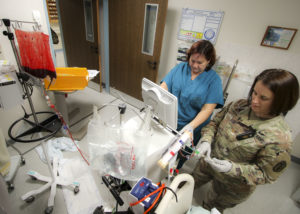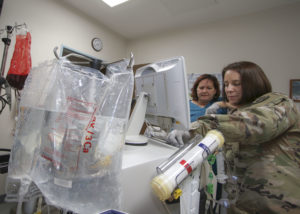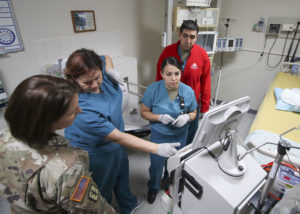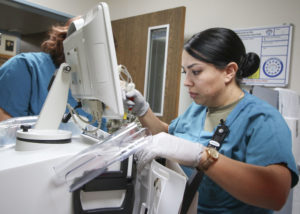
Critical care nurses at Landstuhl Regional Medical Center recently participated in training to familiarize themselves with Continuous Renal Replacement Therapies, to advance capabilities of LRMC’s Intensive Care Unit for patients with kidney failure.
A two-week long training session at Brooke Army Medical Center provided a pair of LRMC critical care nurses with hands-on training operating and troubleshooting dialysis equipment used in continuous 24 hour-per-day therapy. The training marks the first time LRMC ICU nurses have traveled overseas for CRRT training.
“(BAMC) has a fair amount of (CRRT) patients, as the Defense Department’s only Level 1 Trauma Center,” said Petra Wine, one of the critical care nurses who participated in the training. “We do need (CRRT capabilities) because it is our mission, to stabilize our patients and then send them (to the United States for further care).”

Wine, along with U.S. Army Capt. Arfan Malik, a staff nurse at LRMC’s ICU, are tasked to function as subject matter experts for CRRT training at LRMC to magnify current capabilities.
“It is essential for Army Critical Care Nurses to maintain their skill set especially at LRMC, since we randomly receive patients from various locations throughout Europe, Asia and Africa who may require CRRT,” said Malik. “There is also potential for nurses to fly with the patient and the (Critical Care Air Transport Team) if needed for better patient outcomes, even more reason for us to maintain our skills.”
As casualty rates from combat have decreased, the need for retraining focused on specialized care, such as CRRT, was recognized in the ICU. Additionally, the unique position of LRMC as an American hospital on foreign land further complicates opportunities available for hands-on training outside the military treatment facility.
The intensive therapy and language barrier also complicates options for patients and their families, adding unnecessary stress to a difficult situation. Nurses may also be limited in their scope of practice at host-nation medical facilities.

According to Wine, simulation training for CRRT limits the unexpected interruptions which may exist with real patients. For the ICU Nursing Team, the hands-on training received at BAMC with actual patients under supervision maximizes their exposure and competence to the modality.
“We need to be ready for our service members when they come and when they’re injured,” said Wine. “This is what we’re here for, so we should give them the best care we can and we need to train up so that we are ready.”
Eventually, the ICU hopes to develop more CRRT champions to evenly disburse responsibilities and provide 24/7 CRRT coverage at LRMC.

Although some cases of kidney failure is linked to illness and disease, acute intrinsic kidney failure is caused by physical trauma, such as vehicle accidents, leaving a dire need for nurses to be well trained in CRRT operation and troubleshooting.
“There’s constant ongoing training, and there’s a constant desire from the nurses to take care of these patients so they don’t lose those skills,” said Wine.


